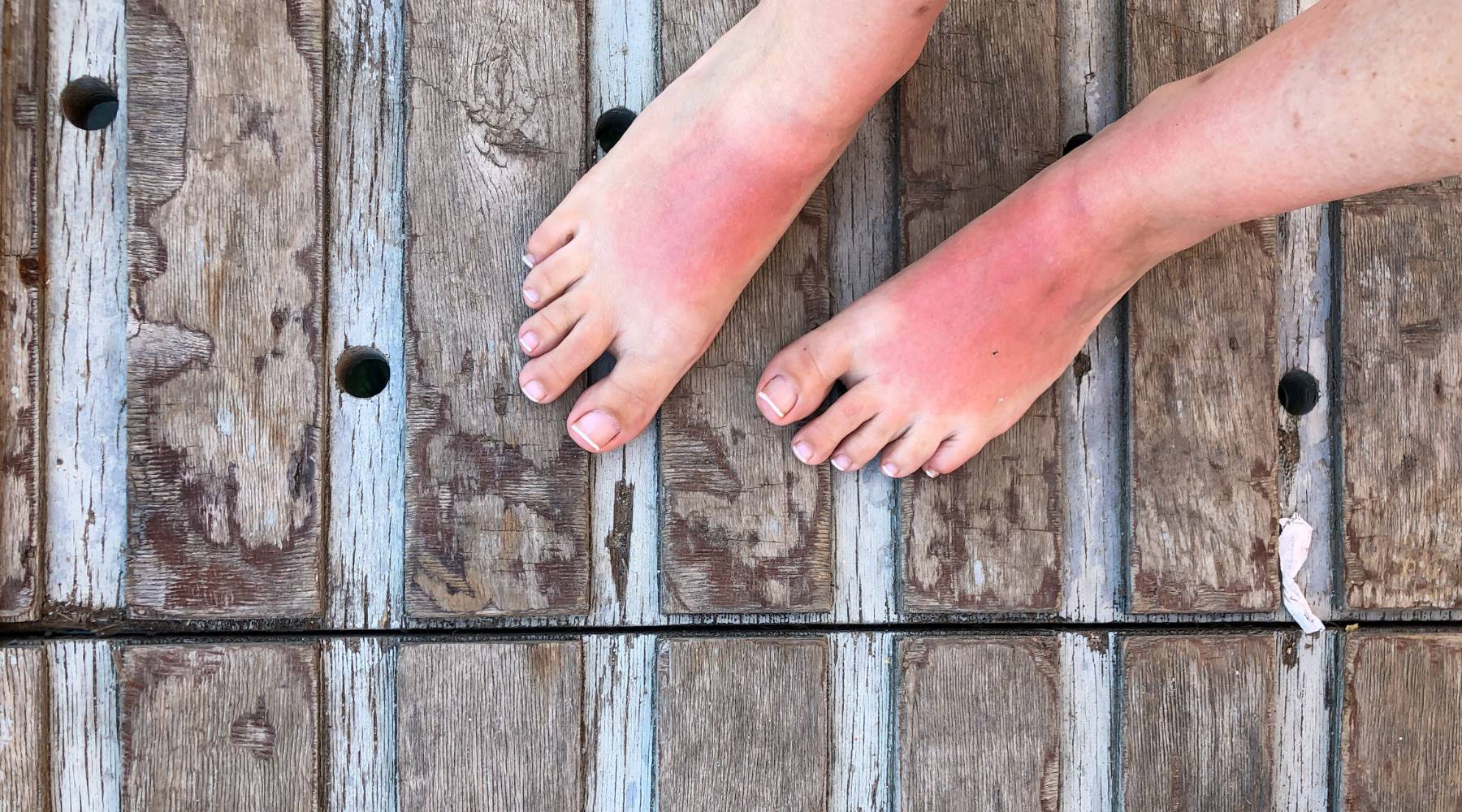
What is sun poisoning? Causes, symptoms, and treatment
According to medical experts at Jackson Health System, sun poisoning is an acute sunburn resulting from excessive exposure to ultraviolet (UV) radiation. Annually, more than 33,000 people are hospitalized in the US for ultraviolet sun damage.
Quick links:
What are the symptoms of sun poisoning?
What can sun poisoning do to me?
Will sun poisoning heal on its own?
Does sunscreen prevent sun poisoning?
Where sunburn harms the outer layer of the skin, sun poisoning affects the body much deeper, causing systemic effects throughout the body. Experts recommend using sun protective strategies, such as sunscreen, sun hats, and sun protective clothing to minimize the risk of sun poisoning.
If you’re going to tan, don’t do so during a high UV index. Read our guide on the best UV index for tanning to understand the dangers and how to tan more safely.
Sun poisoning symptoms
Here are a few symptoms of severe sun poisoning to look out for:
- Skin redness is one of the earliest signs of common sunburn—and of sun poisoning as well.
- Sun poisoning often leads to intense blistering. Sunburned skin may start peeling away in large, unbroken sheets, indicating a deeper level of skin damage.
- Individuals may experience a fever and chills, symptoms not typically associated with a mild sunburn. Dizziness and other heat-related symptoms may also manifest.
- Nausea, vomiting, upset stomach, and other flu-like symptoms can manifest.
- A rapid heartbeat or heart rate fluctuations, often with low blood pressure and shortness of breath, can accompany sun poisoning.
- Rash: a sun poisoning rash can break out over large patches of skin.
- Intense pain: some people may experience severe pain, while others may not.
If you have any of these signs of sun poisoning, drink plenty of fluids, get out of the sun, and get medical help as soon as possible.
What causes sun poisoning?
Sun poisoning is caused by excessive exposure to the sun, obviously. Ultraviolet radiation inflicts damage on the skin and beyond.
- Sun rays: UVA rays penetrate deeply into the skin, contributing to long-term skin damage and aging. UVB rays burn the skin's surface and can damage the DNA in skin cells. Excessive UV radiation can overpower the skin's melanin, which normally protects against sun damage.
- Reflection: surfaces like water, sand, and snow can reflect UV rays, increasing the intensity of exposure.
- Duration: spending long periods of time in the sun without adequate protection increases the risk of sun poisoning.
- UV index: peak sun hours cause sun poisoning much faster than early morning or late afternoon.
- Location: those in proximity to the equator experience stronger UV radiation.
- Environment: UV exposure is more intense at higher altitudes.
- Treatments: some medications can increase the skin's sensitivity to UV rays, increasing the risk of sun poisoning.
- Immune suppression: damaged skin cells can suppress the immune system, and the body's immune response to skin repair can be compromised, leading to sun poisoning.
The effects of sun poisoning can range from moderate to severe, and should be treated promptly.
How to treat sun poisoning
Sun poisoning symptoms can range from mild redness and pain to severe blistering, swelling, fever, chills, nausea, and fatigue. More severe symptoms should be treated at the hospital, while milder cases may be successfully treated at home. If in doubt, consult your doctor.
Hospital treatment
If you go to an urgent care center for sun poisoning, they are likely to treat you with one or more of the following interventions:
- IV fluids for rehydration: one of the primary treatments for sun poisoning in a hospital setting is the administration of intravenous fluids. This is crucial for rehydrating the body, especially if the individual is showing signs of severe dehydration.
- Steroid creams to soothe skin: hydrocortisone cream or other steroid creams may be prescribed to reduce inflammation and soothe blistered or peeling skin.
- Pain medicine and antibiotics: depending on the severity, pain relievers can be administered to manage discomfort. If there is the added risk of an existing infection (especially in cases of severe blistering), antibiotics that need to be taken over a period of time may be prescribed.
Treatment at home
Here’s how to treat sun poisoning at home:
- Aloe vera gel application: aloe vera is known for its soothing properties and can help in healing the skin. Apply it to the affected areas to provide relief from the symptoms of sun poisoning.
- A cold bath or shower can help soothe the skin.
- Drink plenty of water to aid in the body's recovery process.
- Avoid sun re-exposure: protect the affected skin from additional sun exposure until it has fully healed. Stay indoors during peak sunlight hours or wear protective clothing and sunscreen if going outside is necessary.
What can sun poisoning do to me?
Sun poisoning can have a wide range of adverse effects on the human body. Here’s how sun poisoning may affect you.
Immune suppression
Prolonged exposure to UV radiation can suppress the immune system's ability to respond effectively. The weakened immune response makes the body more susceptible to infections and other health issues.
Heat illness
Heat exhaustion is characterized by symptoms like heavy sweating, weakness, and dizziness. If left untreated, it can escalate to heat stroke, a severe condition marked by a lack of sweating, high body temperature, confusion, and even loss of consciousness. Heat stroke can even lead to death.
Skin cancer
The more the skin is exposed to UV radiation, the higher the chance of genetic mutations in skin cells, which can lead to skin cancer. Each instance of sun poisoning, particularly those involving severe sunburn, significantly raises the risk of developing skin cancers in the future.
Can you die from sun poisoning?
It is possible to die from severe sun poisoning. If not treated properly, sun poisoning can lead to heat stroke, heat exhaustion, or infections. Severe cases that cover a large surface area of the body can potentially be life-threatening if not managed medically.
Sun poisoning can also increase the risk of malignant skin cancer such as melanoma, which can be fatal.
Will sun poisoning heal on its own?
Mild cases of sun poisoning may heal on their own as your skin undergoes natural repair processes, similar to minor sunburns, just like an allergic reaction.
However, severe cases require medical attention to prevent complications like infections from blisters, extreme dehydration, electrolyte imbalances, and lasting sun damage that can potentially lead to skin cancer. Staying hydrated is vital in supporting the body’s natural healing process.
How do I avoid sun poisoning?
Prevent sun poisoning with safe sun practices such as the following:
- Broad-spectrum SPF 30+: use a sunscreen that offers broad-spectrum protection with a sun protection factor (SPF) of 30 or higher. This helps shield the skin from both UVA and UVB rays.
- Apply generously before sun exposure: apply a generous amount of sunscreen to all exposed skin at least 20 minutes before going outdoors.
- Reapply every 2 hours: regular reapplication of sunscreen is essential, especially after swimming, sweating, or towel drying.
- Limit direct sunlight between 10 am-4 pm: the sun's rays are most intense during these hours. Seeking shade during this time can significantly reduce the risk of sunburn and sun poisoning.
- Use our handy UV index checker to see the ultraviolet intensity for your area, and take cover during more intense days.
- Wide-brimmed hats and UV-blocking sunglasses: these accessories offer additional protection for the face, neck, and eyes.
- Tightly-woven, full-coverage clothing: wearing clothing that covers as much skin as possible, preferably with UV-protective fabric, can provide an extra layer of defense against UV radiation.
- Build up tolerance: gradually increasing the amount of time spent in the sun can help the skin build a slight tolerance and reduce the risk of severe sunburn or sun poisoning.
- Avoid burning: each burn can increase the risk of skin cancer and long-term skin damage.
- Hydration prevents and treats sun-related illness: carry fluids for dehydration and cool compresses, especially in hot weather or when spending extended periods in the sun. Hydration also helps maintain skin health and aids in the body's overall heat regulation.
Stay safe with Swimzip’s protective gear
SwimZip's sun-protective beach gear, crafted with UPF 50+ fabric, is engineered to block 98% of harmful UVA and UVB rays, offering a high level of defense against sun damage.
These garments are not only a practical safeguard but also come in a variety of styles that cater to both comfort and fashion preferences.
By choosing SwimZip, you're not just selecting a sun-protective clothing option; you're also embracing a lifestyle that prioritizes skin health without compromising style.
Whether you're planning a day at the beach or an outdoor adventure, SwimZip's gear protects you from damaging rays.
FAQs
How can I tell sun poisoning from mild sunburn?
Unlike a typical sunburn, sun poisoning is characterized by more severe symptoms like extensive blistering and peeling. Sun poisoning also typically affects a larger area, which is a distinguishing factor from less severe sunburns.
The presence of systemic symptoms such as dehydration, fever, and confusion, which are not seen in mild sunburns, are indicative of sun poisoning.
Read more about the differences between sunburn and sun poisoning in our in-depth article.
Can too much sun make you sick?
Excessive sun exposure without adequate protection can lead to a variety of health problems beyond sunburns and sun poisoning.
UV radiation can suppress the immune system, increasing susceptibility to infections like cold sores or fungal skin infections. Heat exhaustion, heat stroke, and skin cancer are additional concerns linked to excessive sun exposure. Moderation, protection, and medical care are key.
Do tanning beds cause sun poisoning?
Yes, tanning beds can cause sun poisoning. Tanning beds use ultraviolet (UV) light, which can cause the same harmful effects as the sun.
What is the role of oral steroids in treating sunburn?
Oral steroids, such as prednisone, may be prescribed in cases of extensive, severe sunburn to decrease inflammation and reduce pain.
Is sun poisoning cancerous?
The Iowa Poison Control Center reports that one in five Americans will develop skin cancer in their lifetime.
While sun poisoning itself is not directly cancerous, frequent and severe sunburns significantly increase the risk for skin cancer later in life. This is especially true for fair skin, as protective melanin is lower in these individuals.
Blistering sunburns, especially during childhood and adolescence, are associated with a substantially higher risk of developing deadly melanoma. It's crucial to practice proper sun protection to minimize the risk of sun poisoning and lower the associated risks of skin cancer.
Does sunscreen prevent sun poisoning?
Sunscreen plays a crucial role in preventing both mild sunburns and severe sun poisoning. Broad-spectrum sunscreens with an SPF of 30 or higher can block over 97% of UVB rays that cause burning and also protect from UVA radiation.
However, no sunscreen offers 100% protection. Regular reapplication, especially after swimming or sweating, is necessary. Sunscreen slows the tanning process by limiting UV exposure to the skin in the following ways:
- Blocks 97%+ of UVB rays: sunscreens are designed to block a significant portion of UVB rays, which are primarily responsible for sunburns.
- Shields from UVA damage: broad-spectrum sunscreens also protect against UVA rays, which can cause deeper skin damage.
- Reduces the amount of UV reaching your skin: by applying sunscreen, the amount of UV radiation that reaches the skin is significantly reduced, helping to prevent sunburn and sun poisoning.
- Sunscreen limits UV radiation exposure: by filtering out UV rays, sunscreen reduces the amount of UV exposure, thus limiting the skin's need to produce melanin, which slows down the tanning process.
Does sunburn turn into tan?
Many people think there is no difference between sunburns and a tan.
Tanning is the skin's natural protective response to sun exposure. The skin increases melanin production in response to UV exposure, leading to tanned skin. Melanin absorbs UV radiation to prevent sunburn.
Sunburns occur when UV exposure exceeds the skin’s melanin defenses. While tanning indicates that sun damage has already occurred, a sunburn signifies more extensive damage.
Further reading
What SPF is best for sunscreen?
Resources
Sun Poisoning: Symptoms and Treatment | UHealth Jackson Urgent Care. (2021, January 18). UHealth Jackson Urgent Care. https://jacksonurgentcare.com/illnesses/sun-poisoning/
Sunburn. (n.d.). Cancer Trends Progress Report. https://progressreport.cancer.gov/prevention/sunburn
Sun Poisoning and Prevention. (n.d.). Copyright 2024 Iowa Statewide Poison Control Center. All Rights Reserved. https://www.iowapoison.org/prevention/common-types-of-poisoning/sun-poisoning



Leave a comment
This site is protected by hCaptcha and the hCaptcha Privacy Policy and Terms of Service apply.